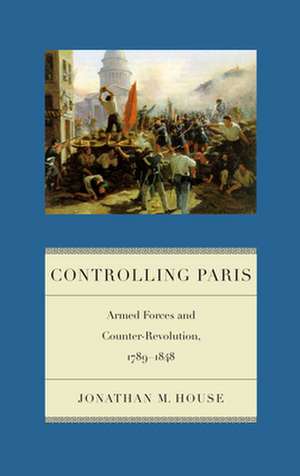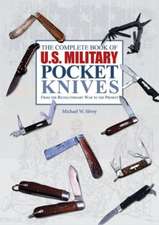Controlling Paris – Armed Forces and Counter–Revolution, 1789–1848: Warfare and Culture
Autor Jonathan M. Houseen Limba Engleză Hardback – 13 feb 2014
Din seria Warfare and Culture
-
 Preț: 244.72 lei
Preț: 244.72 lei - 23%
 Preț: 450.63 lei
Preț: 450.63 lei -
 Preț: 224.72 lei
Preț: 224.72 lei -
 Preț: 411.11 lei
Preț: 411.11 lei -
 Preț: 506.04 lei
Preț: 506.04 lei -
 Preț: 241.08 lei
Preț: 241.08 lei -
 Preț: 243.58 lei
Preț: 243.58 lei -
 Preț: 507.95 lei
Preț: 507.95 lei
Preț: 471.06 lei
Nou
Puncte Express: 707
Preț estimativ în valută:
90.16€ • 93.76$ • 75.44£
90.16€ • 93.76$ • 75.44£
Carte tipărită la comandă
Livrare economică 14-28 martie
Preluare comenzi: 021 569.72.76
Specificații
ISBN-13: 9781479881154
ISBN-10: 1479881155
Pagini: 324
Dimensiuni: 152 x 229 x 15 mm
Greutate: 0.54 kg
Editura: MI – New York University
Seria Warfare and Culture
ISBN-10: 1479881155
Pagini: 324
Dimensiuni: 152 x 229 x 15 mm
Greutate: 0.54 kg
Editura: MI – New York University
Seria Warfare and Culture
Recenzii
"Jonathan Houses detailed and balanced history provides us with a much-needed and most valuable understanding of the part played by military force in the drama of Parisian resistance and revolution 1815-1848. One is struck by what a surprisingly even fight it was when armed crowds confronted armed forces. It is fair to say that the army lost the Revolution of 1830 and the February phase of the Revolution of 1848; moreover, the deadly June days were a more near run thing than one would imagine. This is not a history of righteousness vs. repression, or of order vs. chaos, but of the way things happened. "-John A. Lynn II,Distinguished Professor of Military History, Northwestern University"An important work on civil-military relations that is topical for today."-Jeremy Black,University of Exeter"In France between July 1789 and June 1848, power all too often grew out of the barrel of a gun. Crucial in holding or seizing power was control of the capital city, Paris. In this pioneering and thoroughly researched book, Jonathan M. House shows for the first time the problems on both sides of the barricades, as individuals grappled with the dilemmas of using or not using deadly force. He has made a major contribution to our understanding of the instability and violence that were part of Frances experience for over half a century of revolutions."-Robert Tombs,University of CambridgeControlling Paris is exhaustively researched, closely reasoned, and forcefully written. The range and depth of its coverage of the police, military, and para-military forces active in the suppression of civil unrest in 1848 is unmatched in the literature on the subject. Jonathan M. House has provided an invaluable counterpoint to studies that fixate single-mindedly on the insurgent side of the equation and has thus made possible a fuller understanding of when and how revolutionary upheaval succeeds or fails in its objectives.-Mark Traugott,University of California at Santa Cruz
"Jonathan House's detailed and balanced history provides us with a much-needed and most valuable understanding of the part played by military force in the drama of Parisian resistance and revolution 1815-1848. One is struck by what a surprisingly even fight it was when armed crowds confronted armed forces. It is fair to say that the army lost the Revolution of 1830 and the February phase of the Revolution of 1848; moreover, the deadly June days were a more near run thing than one would imagine. This is not a history of righteousness vs. repression, or of order vs. chaos, but of the way things happened. "-John A. Lynn II,Distinguished Professor of Military History, Northwestern University"An important work on civil-military relations that is topical for today." -Jeremy Black,University of Exeter"In France between July 1789 and June 1848, power all too often grew out of the barrel of a gun. Crucial in holding or seizing power was control of the capital city, Paris. In this pioneering and thoroughly researched book, Jonathan M. House shows for the first time the problems on both sides of the barricades, as individuals grappled with the dilemmas of using or not using deadly force. He has made a major contribution to our understanding of the instability and violence that were part of France's experience for over half a century of revolutions."-Robert Tombs,University of Cambridge"Controlling Paris is exhaustively researched, closely reasoned, and forcefully written. The range and depth of its coverage of the police, military, and para-military forces active in the suppression of civil unrest in 1848 is unmatched in the literature on the subject. Jonathan M. House has provided an invaluable counterpoint to studies that fixate single-mindedly on the insurgent side of the equation and has thus made possible a fuller understanding of when and how revolutionary upheaval succeeds or fails in its objectives."-Mark Traugott,University of California at Santa Cruz
"Jonathan House's detailed and balanced history provides us with a much-needed and most valuable understanding of the part played by military force in the drama of Parisian resistance and revolution 1815-1848. One is struck by what a surprisingly even fight it was when armed crowds confronted armed forces. It is fair to say that the army lost the Revolution of 1830 and the February phase of the Revolution of 1848; moreover, the deadly June days were a more near run thing than one would imagine. This is not a history of righteousness vs. repression, or of order vs. chaos, but of the way things happened. "-John A. Lynn II,Distinguished Professor of Military History, Northwestern University"An important work on civil-military relations that is topical for today." -Jeremy Black,University of Exeter"In France between July 1789 and June 1848, power all too often grew out of the barrel of a gun. Crucial in holding or seizing power was control of the capital city, Paris. In this pioneering and thoroughly researched book, Jonathan M. House shows for the first time the problems on both sides of the barricades, as individuals grappled with the dilemmas of using or not using deadly force. He has made a major contribution to our understanding of the instability and violence that were part of France's experience for over half a century of revolutions."-Robert Tombs,University of Cambridge"Controlling Paris is exhaustively researched, closely reasoned, and forcefully written. The range and depth of its coverage of the police, military, and para-military forces active in the suppression of civil unrest in 1848 is unmatched in the literature on the subject. Jonathan M. House has provided an invaluable counterpoint to studies that fixate single-mindedly on the insurgent side of the equation and has thus made possible a fuller understanding of when and how revolutionary upheaval succeeds or fails in its objectives."-Mark Traugott,University of California at Santa Cruz
Notă biografică
Jonathan M. House is William A. Stofft Professor of Military History at the U.S. Army Command & General Staff College. His previous books include Combined Arms Warfare in the 20th Century; A Military History of the Cold War, 1944-1962; and, with David M. Glantz, When Titans Clashed: How the Red Army Stopped Hitler.










